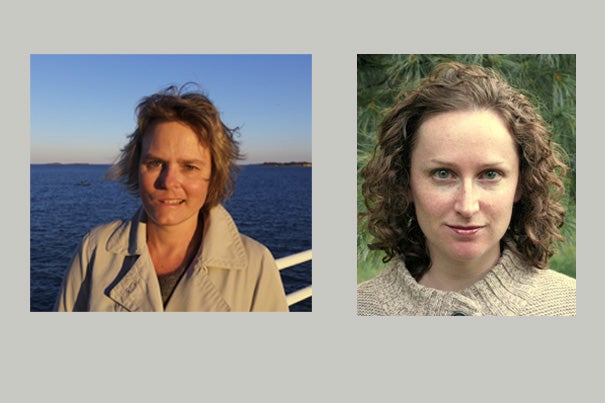
Abramson Award winners Ruth Bielfeldt (left) and Sarah Richardson have shown deep commitment to teaching undergraduates. Bielfeldt plans to use the money that accompanies the award to help fund her new research project. Richardson will use it toward writing a new book.
Two honored for teaching excellence
Professors recognized with Abramson Award for dedication to teaching undergraduates
Ruth Bielfeldt, Harris K. Weston Associate Professor of the Humanities, and Sarah Richardson, John L. Loeb Associate Professor of the Social Sciences, are this year’s winners of the Roslyn Abramson Award, given annually to assistant or associate professors for excellence in undergraduate teaching.
The $10,000 award, established with a gift from Edward Abramson ’57 in honor of his mother, goes to members of the Faculty of Arts and Sciences (FAS) “in recognition of his or her excellence and sensitivity in teaching undergraduates.” Recipients are chosen on the basis of their accessibility, dedication to teaching, and ability to communicate with and inspire undergraduates.
“This year’s winners of the Roslyn Abramson Award have a deep commitment to undergraduate teaching and have created unique and challenging opportunities for active learning,” said Edgerley Family Dean of the Faculty of Arts and Sciences Michael D. Smith. “On behalf of the College and the entire FAS, I offer them my thanks and congratulations.”
Ruth Bielfeldt
“This prize matters as much to me as any book prize,” said Bielfeldt. “When I write a monograph I write it with an ideal reader in my mind, knowing that he/she may not exist in real life. When I teach at this University my ideal audience is always my actual one: Harvard’s students,” she said.
Bielfeldt’s research centers on the iconology and contextual hermeneutics of Greek and Roman art and material culture. She likes to describe her teaching style as akin to midwifery. Bielfeldt said she believes that Socratic dialogue is the most powerful and successful form of teaching, if it is practiced not as a guided and constricted conversation, but as an open and flexible, truly communal enterprise.
Her preferred course form is the seminar. “The seminar is a space of free discourse, a palestra for exploring ideas and intellect, where everyone talks to everyone, freshmen to doctoral candidates and vice versa,” said Bielfeldt. “I, like a referee, try to interfere only when we are in danger of going beyond the limits of sound historical reasoning. This is a wonderful way to encourage freshmen and sophomores to develop their independent voice.”
As a classical archaeologist, Bielfeldt, who teaches courses in the art and archaeology of the classical world, also advocates passionately for teaching outside the classroom, in museums and on digs. “Archaeological fieldwork, unlike any other academic experience, provides what I would like to call a pedagogy of discovery. It presents us with the artifact of the past as it is, unmediated, unstudied, unknown. Objects, more than 2,000 years old, begin to teach us.”
Bielfeldt plans to use the money accompanying the Abramson Award to help fund her new research project on largely forgotten and unpublished bronze candelabra from Pompeii and Herculaneum.
Sarah Richardson
“I am completely overwhelmed and overjoyed to receive this award,” said Richardson. “We all pour our hearts into teaching, and you often don’t immediately know if you are getting across the material or using the right methods. What an amazing thing to be recognized.”
Richardson is a junior professor at the College, teaching on the history of race and gender in the biological sciences, the social dimensions of science, and feminist intellectual history. This spring, she is teaching a new General Education course titled “Gender and Science: From Marie Curie to Gamergate.” The Abramson Award will support the writing of a new book on the history of the science of maternal-fetal effects.
Richardson’s teaching style embodies the Harvard College mission. “I am fierce in my teaching,” she said. “I view each interaction in the classroom as an opportunity for an intellectual transformation for not just the student, but also for myself.”
For Richardson, the classroom presents a host of opportunities to challenge her students. “I am grappling with the same questions I pose to my students,” she said. “Instead of approaching teaching as a transfer of knowledge, I try to pose questions and arguments with which students can engage. The environment is a lot like a sandbox, where we all jump in and mix it up.”
A member of the Harvard Faculty since 2010, Richardson said it is important for her students to feel comfortable, included, and safe in her classroom, but she also likes to shake up standard classroom discussions to ensure students have synthesized the material and can apply it in new and effective ways.




